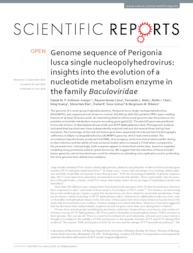Genome sequence of Perigonia lusca single nucleopolyhedrovirus: insights into the evolution of a nucleotide metabolism enzyme in the family Baculoviridae.
Genome sequence of Perigonia lusca single nucleopolyhedrovirus: insights into the evolution of a nucleotide metabolism enzyme in the family Baculoviridae.
Autoria: ARDISSON-ARAÚJO, D. M. P.; LIMA, R. N.; MELO, F. L.; CLEM, R. J.; HUANG, N.; BÁO, S. N.; SOSA-GÓMEZ, D. R.; RIBEIRO, B. M.
Resumo: The genome of a novel group II alphabaculovirus, Perigonia lusca single nucleopolyhedrovirus (PeluSNPV), was sequenced and shown to contain 132,831bp with 145 putative ORFs (open reading frames) of at least 50 amino acids. An interesting feature of this novel genome was the presence of a putative nucleotide metabolism enzyme-encoding gene (pelu112). The pelu112 gene was predicted to encode a fusion of thymidylate kinase (tmk) and dUTP diphosphatase (dut). Phylogenetic analysis indicated that baculoviruses have independently acquired tmk and dut several times during their evolution. Two homologs of the tmk-dut fusion gene were separately introduced into the Autographa californica multiple nucleopolyhedrovirus (AcMNPV) genome, which lacks tmk and dut. The recombinant baculoviruses produced viral DNA, virus progeny, and some viral proteins earlier during in vitro infection and the yields of viral occlusion bodies were increased 2.5-fold when compared to the parental virus. Interestingly, both enzymes appear to retain their active sites, based on separate modeling using previously solved crystal structures. We suggest that the retention of these tmk-dut fusion genes by certain baculoviruses could be related to accelerating virus replication and to protecting the virus genome from deleterious mutation.
Ano de publicação: 2016
Tipo de publicação: Artigo de periódico
Unidade: Embrapa Soja
Palavras-chave: Baculoviridae, Baculovirus, Genoma, Genome assembly, Virus
Observações
1 - Por padrão são exibidas publicações dos últimos 20 anos. Para encontrar publicações mais antigas, configure o filtro ano de publicação, colocando o ano a partir do qual você deseja encontrar publicações. O filtro está na coluna da esquerda na busca acima.
2 - Para ler algumas publicações da Embrapa (apenas as que estão em formato ePub), é necessário ter, no celular ou computador, um desses softwares gratuitos. Sistemas Android: Google Play Livros; IOS: iBooks; Windows e Linux: software Calibre.
Acesse outras publicações
Acesse a Base de Dados da Pesquisa Agropecuária (BDPA) para consultar o acervo completo das bibliotecas da Embrapa.

